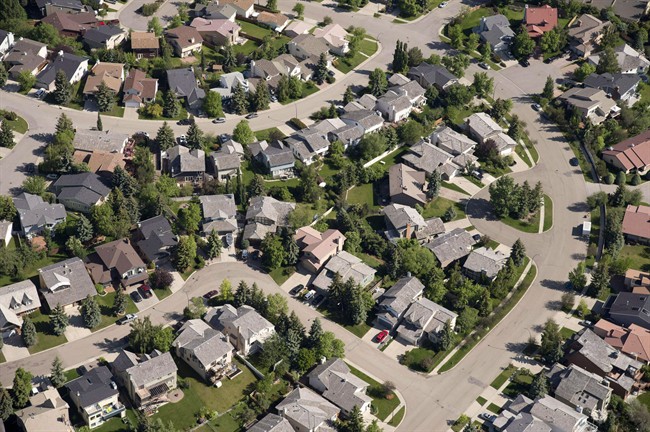The Calgary housing market is “likely to get more attention,” predicts an RBC report on housing affordability released Thursday.

That Calgary homes have become relatively cheap hasn’t really made headlines over the past year — and unsurprisingly so. After all, low prices or not, few Canadians would want to buy a house in a recession-stricken economy.
But Alberta’s economy is showing signs of recovery, noted RBC. And the fact that homes in Calgary haven’t been this affordable since the mid-1980s may soon start to turn heads, suggest economists Craig Wright and Robert Hogue.
READ MORE: Are federal mortgage rules actually working? Not really.
RBC measures affordability as the portion of median pre-tax household income it takes to cover the cost of mortgage payments, property taxes and utilities, based on an aggregate average of market prices for detached houses, condos and other types of homes. In Calgary, where the median home price stands at $478,500, that measure currently sits at 33.8 per cent, well below its long-run average of 40.3 per cent.
In Canada as a whole, housing affordability is 44.2 per cent, although the figure is skewed by Vancouver, Toronto and surrounding areas. RBC calculated Canada’s median home price as $458,100.
READ MORE: Did you sell your home in 2016? Let the CRA know or else…
Signs of revival in Alberta
The RBC report sounded a positive note about Alberta’s economy.
Signs of revival, the bank noted in a separate paper, include small increases in wholesale and retail sales, some slim employment gains since mid-2016 and a positive signal from the housing market itself: the fact that the trend in resale activity has stopped declining.
The recent rebound in oil prices and Ottawa’s approval of Kinder Morgan’s Trans Mountain pipeline in November bode well for the provincial economy, RBC noted. The banks expects GDP to grow at 2.1 per cent in 2017 and 3.3 in 2018.
WATCH BELOW: Highlights from Alberta’s 2017 budget

However, RBC economists warned, “we expect the economic turnaround to be gradual and uneven—which would be a departure from Alberta’s typical ‘boom-bust’ pattern exhibited in past economic cycles.”
The bank expects the province’s unemployment rate to edge up from 8.1 in 2016 to 8.4 this year, before declining to 7.5 per cent in 2018.
READ MORE: Oil will help Alberta’s economy lead Canada in 2017. But that won’t translate into more jobs
In Canada, the jobless rate stood at 6.6 per cent in February.
WATCH BELOW: The difficult decision to enter into a home foreclosure

What the rest of the RBC report says
Toronto
Soaring home prices mean it hasn’t been this hard to buy a house in Toronto since 1990, RBC’s housing report noted. A typical Toronto family would have to spend a whopping 64.6 per cent of its gross income on housing costs, if it were to buy a home at current market prices. The median home price was $760,300.
READ MORE: Toronto is a city where even the ‘rich’ can’t afford an average-priced house: BMO
“The last time affordability was in such a state (in 1990), Toronto’s housing market subsequently fell into a deep and prolonged slump,” RBC’s Wright and Hogue wrote.
“Left unchecked, this situation will get worse, putting at high risk Canada’s largest housing market. Further policy intervention would be prudent to avoid a 1990s-style outcome.” they added.
In Southern Ontario, markets like Hamilton and St. Catharines also showed evidence of eroding affordability.
READ MORE: Toronto Real Estate Board sees another year of double-digit price increases
Vancouver
Vancouver, where the median home price is $999,900, is still by far the most unaffordable city in Canada, with housing accounting for 84.8 per cent of median incomes. That, however, was an improvement from previous years.
Sales of existing homes have slowed down sharply since 2016, something the bank attributed in part to provincial measures to cool down the market. For condos, however, affordability actually eroded slightly during the period.
READ MORE: Vancouver homebuyers lost almost 50 per cent on their down payments in 1 year: graphic
In nearby Victoria, where the median home price has reached $672,900, affordability was 55.1 per cent in the fourth quarter of 2016, up 6.6 percentage points from 2015.
READ MORE: 12 of Canada’s 15 most expensive homes for sale are in Metro Vancouver
Editor’s Note: The paragraph below has been modified. A previous version made an incorrect reference to Newfoundland’s capital St. John’s.
Saint John
Saint John, N.B. remained the most affordable city in RBC’s ranking. Mortgage payments, property taxes and utilities here take up only 25.8 per cent of median incomes. The median home price was $213,300.
“It is more affordable to own a single-detached home in Saint John than a condo apartment in many cities in Canada,” RBC noted.




Comments